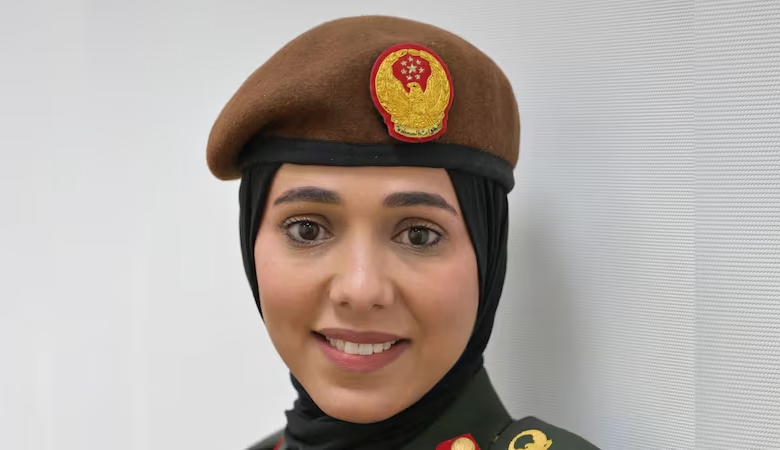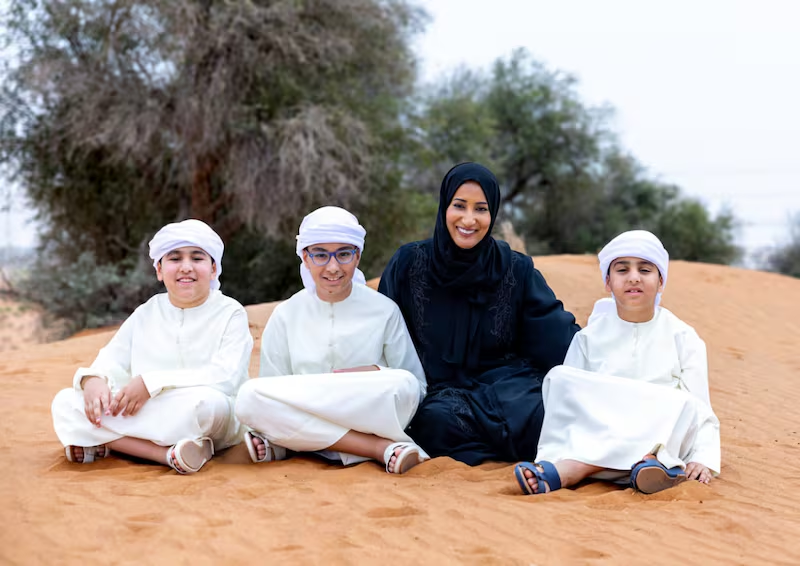
Meet UAE’s Pioneering Female Colonel: A Story of Pride and Perseverance
Colonel Dr. Fayeza Al Ameri is an exceptional female colonel in the UAE defense forces who serves her country through military leadership and medicine. “I chose medicine because I love to relieve people’s pain and suffering. I chose the military because I have passion and love for my country,” she explains. She became the only woman in her family to join the UAE defense forces, continuing a proud military legacy—her father served in the navy and her two brothers are also in the military.
Colonel Al Ameri has led from the front since 2013 and has earned distinction in a field where female colonels remain scarce worldwide. She brings a unique perspective to leadership by embracing feminine strengths rather than pursuing equality with male counterparts. “I tell women not to look for equality with men,” she advises. “We are strong in a way that is different to men”. Her compassion in leadership roles and multitasking capabilities form what she calls her “unique powers”.
Colonel Al Ameri’s story shows how she directs her dual calling while breaking barriers in the UAE military healthcare system. She motivates local Emiratis “to go for specialities that they never thought of”. Her journey mirrors the UAE’s transformation, where women now take prominent roles in traditionally male-dominated fields. Colonel Samira Abdullah Al Ali’s recent promotion marks a historic achievement in Dubai Police’s 69-year history.
Early Life and the Call to Serve

Joining the military as a teenager
Young Emirati women start their military service early. The UAE welcomes women aged 18 to 30 to join optional military service with their parents’ consent. These women serve next to male counterparts who must complete mandatory national service.
Khawla Bint Al Azwar Military School stands as the Gulf region’s first military college for women. Female recruits go through intensive training programs tailored to their needs. Professional female trainers at the school guide women through nine-month military programs under national and reserve service law. They teach leadership skills and physical fitness at world-class standards.
Inspired by family legacy in the armed forces
Family ties strongly motivate young Emirati women toward military careers. Maryam Abdulla Saleh Albadri joined at 18. She had not thought about military service until her father, who served in the UAE Armed Forces, became a martyr in 2022. “After my father passed away, I felt my true place was in the army, where he served with honor and gave his life for our country,” she explains.
Captain Reem Al Buainain became her family’s only woman in military service. Her father’s role as a colonel inspired her path. “I was in awe of him. I loved how he looked in his uniform but I never thought I would have the chance to one day wear it,” she recalls. First Lieutenant Zaina Rashed Al Dhaheri watched her sister at an all-woman parade and decided to follow her father’s and sister’s footsteps into service.
Choosing medicine and military together
Female recruits often balance military service with their education. Some take a break from studies to focus on national service before returning to them. Others join the forces with clear career goals.
Military training has three main parts: basic military instruction, skill-based branch allocation, and field-specific specialized training. Women develop discipline, confidence, and leadership skills through this experience.
Lieutenant Colonel Afra Saeed Al Falasi leads Khawla Bint Al Azwar Military School. She believes military service “countless benefits starting from developing leadership skills, to building strong work team spirit and enhancing self-confidence”.
Leadership with Compassion and Strength
Modern military leadership requires tactical precision and human understanding. Female officers bring unique strengths to their commands in this challenging environment.
Multitasking as a leadership asset
Military operations involve multiple concurrent tasks under pressure. Women in uniform excel at this significant skill and balance numerous responsibilities at once. Research shows that multitasking in military contexts improves operational effectiveness with proper structure. This includes directing operations, monitoring communications, and managing personnel. Digital interruptions can interfere with critical thinking. These interruptions extend workdays and reduce the mental recovery time needed to make sound decisions.
Empathy in decision-making
Empathy is different from sympathy at its core. A military leader’s perspective states, “Empathy is not sympathy. It doesn’t mean that you rub [your soldiers’] bellies and ask them how they feel every morning. What it means is that you can see [the situation] through their eyes.” Empathy connects the art and science of military leadership. It creates a safe space for calculated risk-taking and disciplined initiative. Leaders who master this skill can anticipate reactions, build trust, and make better-informed decisions. Leaders who lack empathy might miss their organization’s human element, which leads to disconnection and dysfunction.
How women lead differently in uniform
Female officers add distinctive talents to leadership roles. Their strengths include team cohesion, interpersonal skills, and empathetic leadership approaches. Research proves that gender-diverse leadership creates a positive atmosphere. This raises job satisfaction and retention rates. Teams with diverse backgrounds provide detailed perspectives in decision-making processes. These perspectives result in thorough solutions – vital qualities for military operations. Female colonels and generals break stereotypes and pave the way for future generations of women in defense.
Breaking Barriers and Setting Precedents
“I take great pride in embodying the values of being Emirati, which include being a symbol of love, family, kindness, and camaraderie. Our communal culture flourishes through our unity, and I believe this is a source of pride for us.” — HH Sheikha Mahra Bint Mohammed Bin Rashid Al Maktoum, Emirati royal, influential public figure and advocate for Emirati culture
Women officers in the UAE military have consistently broken new ground during its rise, especially when you have healthcare in focus.
Firsts in the UAE military healthcare system
Staff Colonel Dr. Aysha Al Dhaheri has emerged as a trailblazer in military medicine. This 46-year-old Zayed Military Hospital physician has served as the first or only female doctor in many UAE humanitarian missions. She made history by guiding the first female medical team in Eritrea in 2015. Dr. Ayesha Al Memari’s achievement at 37 marked another milestone as she became the first Emirati physician to specialize in emergency medicine.
Recruiting and mentoring Emirati medical professionals
Colonel Al Ameri now spearheads initiatives to recruit doctors, nurses, paramedics, and medical technicians for the armed forces. She focuses on attracting Emiratis to specialized roles such as cardiology and nursing. “We encourage UAE locals to go for specialities that they never thought of,” she notes. “This is valuable to the country and we do this from our heart”.
Deployments and field missions
Female officers have taken part in critical humanitarian operations worldwide. Dr. Al Dhaheri has delivered medical care in Afghanistan, Kosovo, Somalia, and Yemen. Female pilot officers have also made significant contributions to ongoing relief efforts and have airdropped humanitarian aid into Gaza.
Recognition and national pride
The Ministry of Defense celebrates its female personnel’s achievements on International Women’s Day. Mohammed bin Ahmed Al Bowardi, Minister of State for Defense Affairs, has emphasized that “the participation of women in the Armed Forces has become a source of pride for every Emirati woman”.
Balancing Duty and Family
“Only the strongest woman can survive, missing half her heart.” — Unknown (widely cited in military spouse communities), Attributed to military spouse experience
Female officers worldwide face the constant challenge of balancing their military duties with family life. This delicate balance demands exceptional dedication and a strong support system.
Motherhood in a military career
Military mothers face unique challenges each day. They often get only two hours with their children after work before bedtime—enough time for dinner, bath, and bedtime stories. The return from maternity leave brings mixed feelings. “Some days, I feel like I’ve got everything under control – thriving as both a mum and an Air Force member. Other days, guilt creeps in,” shares one officer. These servicewomen must also handle unexpected situations when childcare centers call about sick children, which leads them to take carer’s leave or work from home.
Support systems and personal discipline
Strong leadership and family support are vital for servicewomen who manage both roles. Compressed work schedules, flexible arrangements, and on-base childcare facilities help mothers visit their children during breaks. Captain Reem Al Buainain’s story shows how discipline creates balance. This mother of three started military training at 21 and maintains a structured workday from 7am to 2pm. Supportive partners and extended family members create the backbone of their support network.
Advice to young women: strength in difference
Mohammed bin Ahmed Al Bowardi, Minister of State for Defense Affairs, believes that “the participation of women in the Armed Forces has become a source of pride for every Emirati woman”. Experienced female officers often tell newcomers to embrace their unique strengths instead of seeking equality with male counterparts. First Lieutenant Zaina Al Dhaheri shares simple wisdom: “The first success is to work with conscience and have positive energy. Just strive for excellence”.
Colonel Dr. Fayeza Al Ameri’s story proves how women’s roles have evolved in the UAE’s armed forces. She has balanced her medical and military service careers with skill. Her dedication shows how serving the country and caring for patients can work together perfectly. Her achievements mirror the broader changes in the UAE military, where women now hold important positions in many specialties.
Female officers like Colonel Al Ameri add unique strengths to their leadership roles. They know how to multitask, make empathetic decisions, and tackle challenges with fresh views that benefit the entire defense establishment. These groundbreaking women have created their own leadership styles instead of just matching their male colleagues. They highlight their distinct abilities and compassionate approaches to command.
The path has presented major challenges without doubt. Military women must balance their professional duties with family life, which demands exceptional discipline and strong support systems. Yet their determination has shattered many barriers. This is especially true in military healthcare, where female doctors and medical professionals now lead vital humanitarian missions worldwide.
UAE’s recognition of women’s defense contributions marks a fundamental change in culture. Military service has grown from a men-only field into a career where Emirati women discover purpose, pride, and leadership opportunities. Colonel Al Ameri’s recruitment work deepens this progress as she encourages local Emiratis to explore specialized roles they hadn’t considered before.
These pioneering officers have paved the way for future generations of Emirati women. Their stories of dedication, strength, and service exceed gender boundaries—they represent the highest ideals of patriotism and professional excellence. Women like Colonel Al Ameri have served their nation and redefined military leadership through their remarkable achievements.






